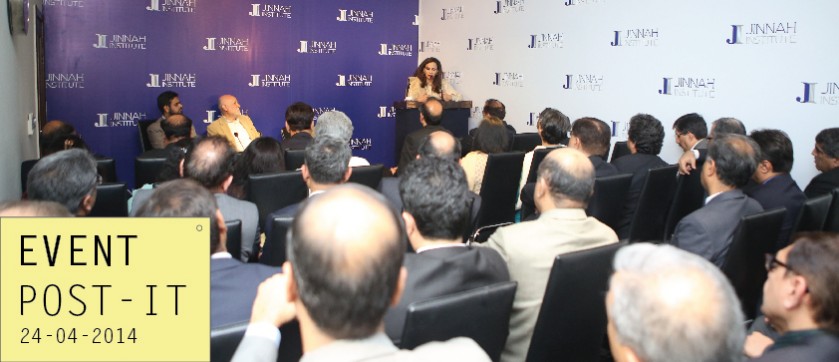Policy Events
Lecture for Pakistan Senior Civil Service Course
Date: April 28, 2014
100th National Management Course visits Jinnah Institute
Senior government officers briefed on Pakistan’s internal security and strategic developments
After the third year of hosting a lecture-panel for Grade 20 civil servants as they fulfill their promotion to Grade 21 formalities, Jinnah Institute has clearly become a staple for the NMC at the NSPP. On Thursday April 24, Jinnah Institute destination for over 50 senior government officers undertaking the National Management Course at the National School of Public Policy (NSPP). As part of their course which includes visits to the Supreme Court, Parliament and Foreign Office, the delegation of senior bureaucrats visited JI and interacted with Jinnah Institute’s President Amb. Sherry Rehman, Honorary Vice President Amb. Aziz Ahmed Khan, and the Institute’s staff on key internal and regional challenges facing the country.
Discussing a broad range of strategic challenges and opportunities available to Pakistan, Amb. Rehman maintained that Pakistan is facing the severest internal challenge from terrorism, which must be decisively addressed in a consistent policy where the state dominates both the narrative and the outcome. Without that, no peace or resolution of the ongoing strategic drift will find conclusion. Whatever course corrections Pakistan has made, or is trying to make in reaching out to its neighbours for peace will be wasted political capital without an unambiguous, time-lined mandate for Constitutional benchmarks in talking to terrorists.
She noted that it was imperative for Pakistan and other regional players to avoid the trap of power-brokering in Afghan affairs. With regional transformations well underway, post-election scenarios in both India and Afghanistan would profoundly determine future security and stability in South Asia.
Highlighting Islamabad’s ‘no-favourites’ policy in Afghanistan, which was initiated three years ago, Amb. Rehman said that while this policy had now begun to yield a narrative dividend, outcomes were still unresolved with many leadership transitions going on to both the west and east of Pakistan. However, Afghan unwillingness to recognize the Pak-Afghan border will frustrate attempts to secure the borderlands in both countries against terrorists.
Amb. Rehman stated that India was making its voice heard at multilateral forums on the basis of its economic clout. India’s swing to the right may be temporary, but it will likely amplify its conditional diplomacy with Pakistan, especially if there is no resolution of the Mumbai episode trials.
Former ambassador and JI Honorary Vice President Aziz Ahmed Khan discussedIslamabad’s
The briefing was followed by an engaging Q&A session with the visiting officers who raisedquestions on key internal and external policy debates.
Coverage: Business Recorder, Pak Observer, Express Tribune, Daily Dunya, Naye Baat, Jahan e Pakistan, Jang, Express.

